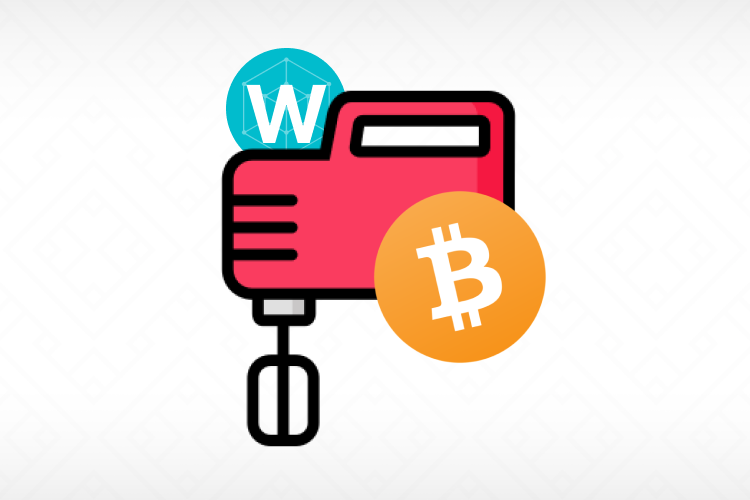
Everyone believed that Bitcoin and the majority of other cryptocurrencies were entirely anonymous during the first few years. At that time, Bitcoin was often used for the purchase of illegal goods or illegal substances, and it was also used for money-laundering. But not long after, it was made clear that Bitcoin is not anonymous.
Everything that occurs on the blockchain is permanently recorded thanks to blockchain technology. This means that individuals, agencies, or governments can use this information to trace these transactions back to the users. In the case that Bitcoin was used for illegal purposes, these users could face serious consequences.
However, technologies are improving on both sides and various centralised or decentralised Bitcoin mixers suddenly appeared.Bitcoin mixer simply sends coins from one central pool back to participating users randomly, but based on the exact amount each wallet is supposed to receive.
From Silk Road to MiCA regulation
As was noted in the introduction, prior to its pseudonymization, individuals mistakenly believed that Bitcoin was anonymous. For example, this misbelief caused that people were buying and selling illegal narcotics on Silk Road and other similar websites. But it didn't take long for the FBI to trace down the website administrator, who, with the help of Bitcoin, enabled the sale of illegal goods and services worth $1 billion.
In February 2015, Ross Ulbricht, the Silk Road's 31-year-old administrator, received a life sentence. Since then, numerous organizations, on-chain analysis agencies, governments, and even private citizens have been exploring methods to link real-world identities to Bitcoin transactions.
For instance, the MiCA (Markets in Crypto-assets) law, which was has been recently announced in the European Union, mandates that all transactions involving cryptocurrencies must be monitored. Any crypto services are required to keep records of who sent what value where and when, as well as from where and to whom. This is completely contrary to the nature of Bitcoin and makes it very difficult for services like crypto-exchanges to function. The purpose of Bitcoin was to establish a decentralized financial system as the alternative to the struggling global monetary system.
The most significant innovation, development, and progress in the fields of money, finance, and wealth may be halted by excessive rules and regulations like these. Since MiCA is applicable in the EU, numerous rules, such as MiCA, claim to inhibit whatever advancement Bitcoin might have achieved, particularly in the Eurozone. The EU's customers and Bitcoin users will suffer as a result, and many enterprises may leave the region in search of territories or countries with more benevolent regulations.
The majority of central exchanges seem to be on board
Unfortunately, the majority of centralized cryptocurrency exchanges as well as some wallets or platforms for buying and selling Bitcoin and other cryptocurrencies are, sadly, assisting in this effort. Exchanges frequently request identification documents or other forms of identification to verify that their users and clients are who they claim to be due to the implementation of regulations like KYC (know-your-customer) and AML (anti-money-laundering). This means that these companies and governments can virtually track everything you do in the cryptocurrency world that is associated with that wallet, beginning with the first time you link your ID to any exchange service that requests it.
Once you link your ID to your wallet, it’s fairly simple to trace all your transactions, unless you use CoinJoin, Bitcoin mixer, or anonymous cryptocurrency. Therefore, it is much preferable to begin with non-KYC purchases of Bitcoin before opening a KYC account and attempting to anonymize funds obtained through KYC platforms.
Whir service is a Bitcoin mixer alternative
The best approach to avoid any kind of surveillance, as was frequently discussed in our article, is to simply try to obtain non-KYC Bitcoins or satoshis. This simply means refraining from using any ID on any crypto-related portal, avoiding making purchases using cards linked to your bank accounts, or flaunting your «Bitcoin wealth» around. Utilizing platforms and services that enable privacy and anonymity is another wise recommendation.
However, Bitcoin mixers have some issues. First of all, major exchanges such as Binance do not allow withdrawal to addresses that can be associated with mixers.If the pool of users using Bitcoin mixer is too small is another problem, because crypto analysis agencies might pair these transactions back to original users. And lastly, there is a question of morality, sincethese services are being restricted by regulators. The latest example of such case is Tornado Cash mixer ban in the U.S.
Whir offers another alternative how to easily anonymise your Bitcoin. Because it employs CoinJoin technology, anyone can use and spend Bitcoins privately using this platform. As a result, the receivers of these transactions can not be traced by governments or surveillance agencies like Chainalysis. Combining multiple payments from multiple spenders into a single transaction CoinJoin makes it impossible for anyone to determine which spender paid which recipient. In comparison to Bitcoin mixers, Whir is easy and very convenient. Just enter the recipient wallet address and the amount you need to send, and Whir, thanks to CoinJoin technology will do the rest.
Conclusion: Without a doubt, the regulators will pursue cryptocurrencies like Bitcoin with greater vigor. They will attempt to «fight it» because they can no longer «ignore it» or «laugh at it.» However, we all know how that adage goes, and until something really unforeseen occurs, BTC will win thanks to the privacy and anonymity features that services like Whir offer.
















